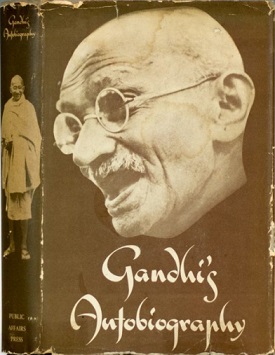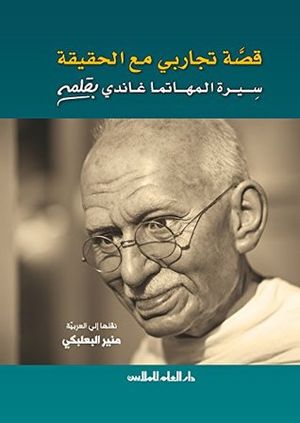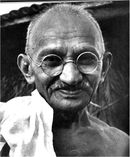قصة تجاربي مع الحقيقة
 First US edition (1948) | |
| المؤلف | Mohandas Karamchand Gandhi |
|---|---|
| العنوان الأصلي | [સત્યના પ્રયોગો અથવા આત્મકથા] Error: {{Lang}}: text has italic markup (help) |
| المترجم | Mahadev Desai |
| البلد | India |
| اللغة | Gujarati |
| ISBN | 81-7229-008-X (India) ISBN 0-8070-5909-9 (United States – authorised edition with foreword by Sissela Bok, Beacon Press 1993 reprint) ISBN 0-486-24593-4 (Dover Publications 1983 reprint of 1948 Public Affairs Press edition) |
النص الأصلي | સત્યના પ્રયોગો અથવા આત્મકથા في Gujarati معرفة المصادر |
قصة تجاربي مع الحقيقة هو كتاب سيرة ذاتية للمهاتما غاندي
The Story of My Experiments with Truth (گجراتي: Satya Na Prayogo athva Atmakatha, حرفياً 'Experiments of Truth or Autobiography') is the autobiography of Mahatma Gandhi, covering his life from early childhood through to 1921. It was written in weekly installments and published in his journal Navjivan from 1925 to 1929. Its English translation also appeared in installments in his other journal Young India.[1] It was initiated at the insistence of Swami Anand and other close co-workers of Gandhi, who encouraged him to explain the background of his public campaigns. In 1998, the book was designated as one of the "100 Best Spiritual Books of the 20th Century" by a committee of global spiritual and religious authorities.[2]
Starting with his birth and parentage, Gandhi has given reminiscences of childhood, child marriage, relation with his wife and parents, experiences at the school, his study tour to London, efforts to be like the English gentleman, experiments in dietetics, his going to South Africa, his experiences of colour prejudice, his quest for dharma, social work in Africa, return to India, his slow and steady work for political awakening and social activities.[3] The book ends abruptly after a discussion of the Nagpur session of the Congress in 1915.[4]
اقتباسات
كان اليهود القدماء يعتبرون أنفسهم شعب لله المختار، دون غيرهم من الخلق،
مما يجلب على سلالتهم التعرض إلى جزاء غريب، وظالم. وبنفس الصورة تقريبًا،
اعتبر الهندوس أنفسهم المختارين (آريا) أو المتحضرين، واعتبروا الآخرين من عشيرتهم
وأصدقائهم منبوذين (أناريا). أدى ذلك إلى صب انتقام غريب، ليس فقط على الهندوس
في جنوب أفريقيا بل أيضًا على المسلمين والبارسيين، لأنهم ينتمون إلى نفس البلد وتحمل
جلودهم نفس لون بشرة إخوانهم الهندوس.
****
لكنني كنت دائمًا أعطي الأولوية لتهذيب الروح أو بناء الشخصية. ونظرًا لشعوري
بالثقة بأن التعليم الأخلاقي يمكن أن يُمنح للجميع على حد سواء مع اختلاف أعمارهم ونشأتهم
***
كان السيد عبد لله
يرفض أن يناديني باسم غاندي.
اختار السيد عبد لله لقبًا حسنًا، وهو أخ أو،« بهاي »
وظلوا ينادونني به حتى رحيلي عن جنوب أفريقيا، وكان للاسم وقع جميل على أذني
عندما كان يصدر عن الهنود العاملين بعقود لأجل.
:
أؤمن، من واقع خبرتي، أنه إذا كان قلب المرء نقيٍّا يجد رجالًا يساعدونه عند وقوع
الكارثة وحلولًا للخروج منها
ملاحظات
الهامش
- ^ خطأ استشهاد: وسم
<ref>غير صحيح؛ لا نص تم توفيره للمراجع المسماةRichard - ^ "Spiritual books of the century". USA Today. 2 December 1999.
- ^ Joshi, Ramanlal (1997). "Satyana Prayogo Athwa Atmakatha (Experiments with Truth or Autobiography)". In George, K. M. (ed.). Masterpieces of Indian Literature. Vol. 1. New Delhi: National Book Trust. pp. 358–359. ISBN 81-237-1978-7.
- ^ Mehta, Chandrakant (1992). "Satyana Prayogo Athva Atmakatha". In Lal, Mohan (ed.). Encyclopaedia of Indian Literature: Sasay to Zorgot. New Delhi: Sahitya Akademi. p. 3869. ISBN 978-81-260-1221-3.
المصادر
- Malinar, Angelika (2019). "Chapter 30 : Mohandas Karamchand Gandhi: [An Autobiography or The Story of My Experiments with Truth]". In Wagner-Egelhaaf, Martina (ed.). Handbook of Autobiography / Autofiction. De Gruyter Handbook. Berlin, Boston: De Gruyter. pp. 1703–1718. doi:10.1515/9783110279818-141. ISBN 978-3-11-038148-1. قالب:Closed access
- Suhrud, Tridip (2011). "Gandhi's key writings: In Search of Unity". In Brown, Judith; Parel, Anthony (eds.). The Cambridge Companion to Gandhi. Cambridge University Press. pp. 71–92. ISBN 978-1-139-82484-2.
- Suhrud, Tridip (November–December 2018). "The Story of Antaryami". Social Scientist. 46 (11–12): 37–60. JSTOR 26599997.
وصلات خارجية
- قالب:Wikisourcelang-inline
- قصة تجاربي مع الحقيقة في كتب گوگل
- قصة تجاربي مع الحقيقة في كتب گوگل (critical edition)
- National Institute of Technology Calicut, Kozhikode: Nalanda Digital Lib.
- An Autobiography or The Story of my Experiments with Truth, full text
- Read online The Story of My Experiments with Truth - Gandhi Heritage Portal
- Short description is different from Wikidata
- Lang and lang-xx template errors
- Articles containing گجراتي-language text
- Articles that link to foreign-language Wikisources
- Pages to import images to Wikidata
- Pages using Lang-xx templates
- Books about Mahatma Gandhi
- Indian autobiographies
- 20th-century Indian books
- Political autobiographies
- Nonviolence
- Gujarati-language books
- Books about activism
- Literature first published in serial form

